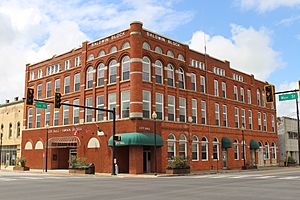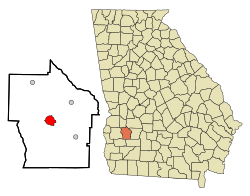Dawson, Georgia facts for kids
Quick facts for kids
Dawson, Georgia
|
|
|---|---|

Dawson City Hall
|
|

Location in Terrell County and the state of Georgia
|
|
| Country | United States |
| State | Georgia |
| County | Terrell |
| Area | |
| • Total | 3.75 sq mi (9.72 km2) |
| • Land | 3.75 sq mi (9.72 km2) |
| • Water | 0.00 sq mi (0.00 km2) |
| Elevation | 351 ft (107 m) |
| Population
(2020)
|
|
| • Total | 4,414 |
| • Density | 1,176.44/sq mi (454.25/km2) |
| Time zone | UTC-5 (Eastern (EST)) |
| • Summer (DST) | UTC-4 (EDT) |
| ZIP codes |
39842
|
| Area code(s) | 229 |
| FIPS code | 13-21912 |
| GNIS feature ID | 0313367 |
Dawson is a city in Terrell County, Georgia, in the United States. It is the main city, also known as the county seat, of Terrell County.
In 2020, about 4,414 people lived in Dawson. The city was officially started on December 22, 1857. It was named after Senator William Crosby Dawson. Dawson is also part of the larger Albany, Georgia area.
Contents
History of Dawson
Dawson was founded in 1856. It became the main city for the new Terrell County. It was first called a town in 1857 and then a city in 1872.
During the 1960s, Terrell County was an important place for the Civil Rights Movement. The SNCC, a group that worked for civil rights, called the county "Terrible Terrell." Jackie Robinson, a famous baseball player, helped raise money to rebuild three Black churches in the area that had been burned down.
In 1976, five young African-American men were accused of a crime. They became known as "The Dawson Five." The court later dropped the charges against them. This happened because there was proof that police had acted unfairly. For example, they had forced the young men to say things that were not true.
Where is Dawson Located?
Dawson is in Southwest Georgia. It is located along U.S. Route 82 and Georgia State Route 520. These roads connect Dawson to other towns nearby. For example, Sasser is about 8 miles (13 km) southeast. Parrott is about 9 miles (14 km) northwest.
U.S. Route 82 also goes west to Cuthbert, which is 21 miles (34 km) away. Albany is 24 miles (39 km) southeast. Columbus is 63 miles (101 km) northwest.
The city covers an area of about 3.7 square miles (9.7 square kilometers). All of this area is land.
People in Dawson
| Historical population | |||
|---|---|---|---|
| Census | Pop. | %± | |
| 1860 | 521 | — | |
| 1870 | 1,099 | 110.9% | |
| 1880 | 1,576 | 43.4% | |
| 1890 | 2,284 | 44.9% | |
| 1900 | 2,926 | 28.1% | |
| 1910 | 3,827 | 30.8% | |
| 1920 | 3,504 | −8.4% | |
| 1930 | 3,827 | 9.2% | |
| 1940 | 3,681 | −3.8% | |
| 1950 | 4,411 | 19.8% | |
| 1960 | 5,062 | 14.8% | |
| 1970 | 5,383 | 6.3% | |
| 1980 | 5,699 | 5.9% | |
| 1990 | 5,295 | −7.1% | |
| 2000 | 5,058 | −4.5% | |
| 2010 | 4,540 | −10.2% | |
| 2020 | 4,414 | −2.8% | |
| U.S. Decennial Census 1850-1870 1870-1880 1890-1910 1920-1930 1940 1950 1960 1970 1980 1990 2000 2010 |
|||
As of the 2020 United States census, there were 4,414 people living in Dawson. There were 1,577 households and 1,080 families.
| Race | Num. | Perc. |
|---|---|---|
| White (non-Hispanic) | 613 | 13.89% |
| Black or African American (non-Hispanic) | 3,618 | 81.97% |
| Native American | 6 | 0.14% |
| Asian | 44 | 1.0% |
| Pacific Islander | 1 | 0.02% |
| Other/Mixed | 88 | 1.99% |
| Hispanic or Latino | 44 | 1.0% |
Education in Dawson
Terrell County School District
The Terrell County School District serves students from pre-school all the way to twelfth grade. The district has two elementary schools, one middle school, and one high school. There are 98 full-time teachers and over 1,764 students.
- Cooper-Carver Elementary School
- Terrell County Middle High School
Private Education
- Terrell Academy - This school was started in response to public schools becoming racially integrated.
Colleges and Universities Nearby
There are several colleges close to Dawson. Students can easily travel to them.
- Albany State University in Albany
- Albany Technical College in Albany
- Andrew College in Cuthbert
- Georgia Southwestern State University in Americus
Famous People from Dawson
Many interesting people have come from Dawson.
- Lucius D. Battle (1918–2008) - He was an ambassador to Egypt.
- Lawrence Edward Carter, Jr. (1941-) - A historian, professor, and expert on civil rights. He was the Dean of the Martin Luther King Jr. International Chapel at Morehouse.
- Erle Cocke Jr. (1921–2000) - A businessman and a general in the U.S. National Guard.
- Wayland Flowers (1939–1988) - A puppeteer famous for his puppet "Madame."
- Bessie Jones (1902–1984) - A gospel and folk singer.
- Dawson Five - Five young Black men who were wrongly accused of a crime in 1976. The charges were dropped in 1977 due to unfair police actions.
- Benjamin J. Davis Jr. (1903–1964) - An attorney and a New York City Councilman.
- Robert J. Jones - The Chancellor of the University of Illinois at Urbana-Champaign.
- Otis Redding (1941–1967) - A very famous singer, songwriter, and music producer. He is known for his soul and rhythm and blues music.
- Cole Swindell (born 1983) - An American country music singer and songwriter.
- Walter Washington - The first elected mayor of Washington, D.C..
See also
In Spanish: Dawson (Georgia) para niños
 | James B. Knighten |
 | Azellia White |
 | Willa Brown |

